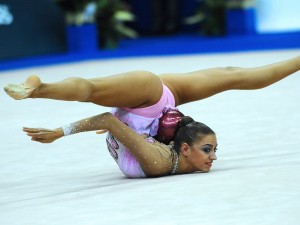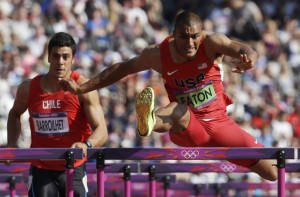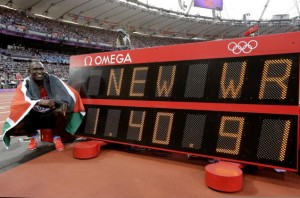Rhythmic Gymnastics
I upset fans of equestrian eventing by declaring in my Day 3 commentary that it should not be an Olympic sport. Well, fans of rhythmic gymnastics should prepare to get their tutus ruffled; because I hereby declare that it is even more underserving of Olympic accreditation.
F rankly, as I watched no less a person than defending Olympic champion Yevgenia Kanayeva of Russia in the individual all-around today, I got the impression I was watching auditions for the female lead in a live performance of the Kama Sutra.
rankly, as I watched no less a person than defending Olympic champion Yevgenia Kanayeva of Russia in the individual all-around today, I got the impression I was watching auditions for the female lead in a live performance of the Kama Sutra.
Mind you, some of the rhythmic positions she got into demonstrated beyond all doubt that she’s quite athletic. It’s just that her performance, as well as the admittedly less erotic performances of her fellow competitors, seemed more suited for the Cirque du Soleil than the Olympics.
Soccer
It speaks volumes that women’s Beach Volleyball has sustained far more public interest throughout these Games than women’s Soccer. Not least because, after the USA won the 1999 FIFA World Cup (most noted for the indelible image of Brandi Chastain’s sports-bra celebration), public interest was such that one got the impression it was only a matter of time before this sport overtook Baseball as America’s favorite pastime.
Yet, coverage surrounding the bona-fide rivalry between the USA and Japan in the women’s Soccer final today paled in comparison to that which surrounded the intramural play between two American teams in the women’s Beach Volleyball final yesterday. Of course, given that efforts to establish a women’s professional soccer league in the afterglow of the 1999 World Cup proved a Sisyphean task, I suppose we should have seen this public disaffection coming.
But public interest aside, I saw enough of this gold-medal match to appreciate why what little hype it received was entirely warranted. Japan played like it had a chip on its shoulders. No doubt this stems from getting virtually no acclaim or respect despite defeating the two-time defending Olympic champion USA in last year’s World Cup final.
 On the other hand, media previews suggested that the USA would use this occasion to pay back Japan for defeating it in that World Cup much as it paid Japan back for attacking it at Pearl Harbor. Such were the desperate efforts to stoke public interest in this match….
On the other hand, media previews suggested that the USA would use this occasion to pay back Japan for defeating it in that World Cup much as it paid Japan back for attacking it at Pearl Harbor. Such were the desperate efforts to stoke public interest in this match….
As it turned out, the two teams could not have been more evenly matched – in every respect. Indeed, if ever a soccer match should have ended in a tie at the end of regulation, this was it. Except that, after the USA scored in the eighth and 54th minutes, Japan could not get a second after it scored in the 63rd minute. Thus the USA won its third consecutive Olympic title 2-1 … along with some measure of redemption.
It must be said, however, that in this sport winning the World Cup is a much bigger deal than winning Olympic gold. Perhaps this explains why reigning men’s World Cup champion Spain apparently felt no shame about getting kicked out in the first round at these Olympic Games. Worse still, the USA men’s team did not even qualify to participate. Brazil plays Mexico for gold on Saturday, but who cares?
Track and Field
In Gymnastics, the winner of the all-round is considered the best athlete in the sport; in Swimming that title goes to the winner of the individual medley. In this sense, the winner of the decathlon for men and heptathlon for women is considered the best athlete in Track and Field.
(“London Olympics: Day 8,” The iPINIONS Journal, August 4, 2012)
 I was impressed when Jessica Ennis of Great Britain lived up to her billing by winning the heptathlon on Saturday. But I was even more so when Ashton Eaton of the United States won the decathlon today.
I was impressed when Jessica Ennis of Great Britain lived up to her billing by winning the heptathlon on Saturday. But I was even more so when Ashton Eaton of the United States won the decathlon today.
Athletes compete over two consecutive days for the most points in 10 events: the 100m, long jump, shot put, high jump, and 400m on the first day; and the 110m hurdles, discus throw, pole vault, javelin throw, and 1500m on the second.
But Eaton was so dominant on the first day yesterday that today’s second day of competition amounted to little more than a victory lap. Trey Hardee of the USA won silver; Leonel Suarez of Cuba, bronze.
Meanwhile, after his performance in the 100m on Sunday, Usain Bolt seemed a lock to become the first man in history to defend Olympic titles in the men’s 100m and 200m. He did not disappoint. In fact, Bolt led a Jamaican sweep in the men’s 200m today – with Yohan Blake, runner-up in the 100m, trailing for silver; Warren Weir, who was not even fast enough among Jamaicans to qualify for the 100m, bronze.
All Bolt has to do now is anchor the Jamaican 4x100m relay to gold on Saturday. This would complete his quest for a repeat trifecta (i.e., of winning gold in the same three events he won in Beijing) and certify his status as a legend in this sport.
 Finally, even though I’m not too crazy about the distance events, I cannot fail to mention the remarkable win by David Rudisha of Kenya in the men’s 800m. Not least because he did what no other athlete, not even Usain Bolt, has managed to do on the track at these Olympic Games: set a world record. The old record of 1.41.11 was set by Wilson Kipketer of Denmark in 1997. Rudisha ran 1.40.91.
Finally, even though I’m not too crazy about the distance events, I cannot fail to mention the remarkable win by David Rudisha of Kenya in the men’s 800m. Not least because he did what no other athlete, not even Usain Bolt, has managed to do on the track at these Olympic Games: set a world record. The old record of 1.41.11 was set by Wilson Kipketer of Denmark in 1997. Rudisha ran 1.40.91.
The Kenyans of course have won many Olympic medals. Which I suspect is why Rudisha took such pride in pointing out that he is a Maasai and that this is the first-ever individual gold for his people.
Also of interest is that second-place finisher Nijel Amos of Botswana ran the exact time of 1.41.73 that none other than the chairman of the London organizing committee, Lord Sebastian Coe, ran in 1981 when he set the world record in this event that Kipketer broke in 1997. Timothy Kitnum of Kenya won bronze.
MEDAL COUNT: USA: 90; China: 80; Russia: 56